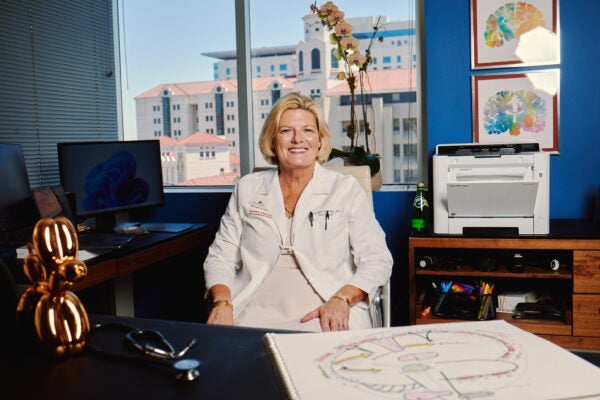During her years on the Forty Acres, Kimberly Monday, B.A. ’88, studied at the College of Liberal Arts (COLA). She is now an associate professor and vice chair in the Department of Neurology at the UT Health Science Center in Houston and recognizes the role COLA has played in her success. With her wife, Laura Marangell, Kimberly created the Monday Family Endowment for Liberal Arts to support undergraduate research.
Certified by the American Academy of Psychiatry and Neurology in adult neurology, clinical neurophysiology and sleep medicine, Kimberly serves on the boards of the Texas Neurological Society, the Texas Medical Association and the Memorial Hermann Physician’s Organization. But to view her success simply through the lens of her career accomplishments would overlook a major part of why she is highly regarded as one of the best in her field. Her compassion, empathy and unrelenting interest in the people she treats is paramount to her reputation.
“It can take up to 12 years of technical study to become a medical doctor,” Kimberly says. “There’s simply no way of getting around learning all the scientific principles necessary before entering the field, but I still consider the training I received at COLA to be some of the most important in shaping the kind of doctor I am today.”
Learning to Listen
 Kimberly earned her bachelor’s degree from the Plan II Honors Program, a competitive and interdisciplinary curriculum that combines STEM-related, social science and liberal arts courses.
Kimberly earned her bachelor’s degree from the Plan II Honors Program, a competitive and interdisciplinary curriculum that combines STEM-related, social science and liberal arts courses.
“I can remember feeling really uncomfortable in some classes — particularly ethics and philosophy — because many of the ideas being discussed challenged my ethical and moral understanding of things,” Kimberly says. “The kind of critical and analytical discussions I was exposed to at COLA helped me develop key life skills: empathy, knowing not to take things personally, and avoiding shutting down when someone disagrees with you.”
Of all the skills she gained from her liberal arts education, Kimberly says “true listening” may be the most important in her day-to-day as a medical provider.
“Life is very gray — something we often only fully understand once our hair turns gray too —and there’s never one answer,” Kimberly says. “A liberal arts education shows you this in a way more rigid disciplines like science and engineering cannot, and that has helped me relate more easily to people and patients.”
Expanding Access to Stroke Care
Knowing that patients sometimes face obstacles such as language barriers, financial disparities or geographical location, Kimberly is committed to expanding access to world-class health care. She is part of a group from the Texas Neurological Society that is spearheading efforts to expand funding for mobile stroke units — ambulances equipped with CAT scanners and other related equipment that can travel to stroke victims in remote areas. A recent study has shown these units could save many lives, Kimberly says, and she intends to help argue their case in front of lawmakers.
“This legislative session, we are focused on convincing the state to fund more of these mobile units so we can save more Texans’ lives,” Kimberly says. “There’s only a handful of legislators who are also physicians, so it’s hard for people to understand why these matters are important. That’s where we come in — to explain to lawmakers how these units can help us provide essential care more quickly and efficiently to more Texans. Everyone is entitled to care, regardless of their location in the Lone Star State.”
Lifetime Honors
In January, Kimberly received the Texas Neurological Society’s 2025 Lifetime Achievement Award — an accolade she credits in part to her liberal arts background.
“I’m honored, particularly since it’s selected by my peers,” she says of the award. “I spent a lot of time in organized medicine advocating for my fellow physicians as well as my patients. This feels like recognition of that work.”
“Lifetime achievement” awards can imply the recipient has reached the end of their career, but that isn’t the case for Kim. If anything, she’s adding to her obligations, including a new position back where it all began. This academic year, she was appointed chair of COLA’s Advisory Council, a role she plans on using to advocate for liberal arts education.
“What’s exciting about UT Austin being a tier-one research university now is having a world-class liberal arts program alongside Dell Medical School,” Kimberly says. “The expertise in sociology, psychology, ethics and philosophy at COLA can’t be matched. The fact that it’s housed right next to a medical school where interdisciplinary collaboration is already a core educational approach is a priceless opportunity.”
As she begins her two-year term, Kimberly is resolute that a liberal arts education is more important now than ever before. The Monday Family Endowment for Liberal Arts provides funding for the college’s Rising Researcher Awards, which recently recognized five students conducting research in linguistics, sociology, policy and more. But Kimberly is clear that the liberal arts aren’t just for student researchers — they’re also for aspiring doctors.
“What we learn in a four-year science degree will have already changed after two years, so our graduates need to be critical thinkers,” Kimberly says. “They also need to be good with people and good listeners. It’s very easy to write a prescription. It’s much more difficult to make sure the patient understands why they should take the prescription,” she adds. “You can’t address each patient like they are on a conveyor belt. This requires the kinds of skills gained through liberal arts.”




